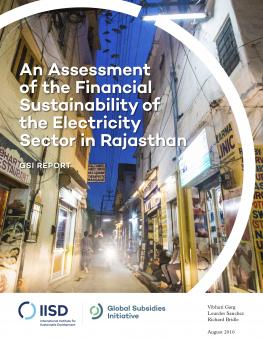
An Assessment of the Financial Sustainability of the Electricity Sector in Rajasthan
This report examines the performance of the electricity sector in Rajasthan, assessing its ability to recover operating costs, reliably meet demand, make investments and operate according to environmental and social norms.
This report examines the performance of the electricity sector in Rajasthan, assessing its ability to recover operating costs, reliably meet demand, make investments and operate according to environmental and social norms.
Rajasthan’s electricity sector is going through a period of transformation, with the expansion of renewable energies, the appearance of private actors in power generation, and the need to expand transmission and distribution networks to achieve universal electricity access.
This report shows that, as new generation capacity is being brought onstream, the level of reliability is generally improving and more consumers are being connected to the grid. However, these improvements result in increasing costs for distribution companies (discoms)—costs that are not met by a corresponding increase in revenues, due to a long-standing inability to raise electricity tariffs. As a consequence, discoms have increased their dependence on fiscal transfers from the government.
The report concludes that the single biggest power sector challenge for Rajasthan is to attain financial viability for the discoms by covering the costs of power generation and distribution from the sale of electricity—especially when considering the large opportunity costs in terms of spending on other developmental priorities.
.
Participating experts
You might also be interested in
Increased Support Needed to Achieve India's Clean Energy Goals
India is on track to achieve many of its 2030 clean energy goals but needs to step up government support measures to accelerate the deployment of offshore wind, electric vehicles, and green hydrogen, according to a new report.
Budgeting for Net Zero
This study estimates the cost gap for battery energy storage systems (BESSs), offshore wind, solar photovoltaic (PV), electric vehicles (EVs), and green hydrogen (GH2) to inform government support.
India Faces Clean Energy Challenges as Energy Demand Soars and Global Fossil Fuel Subsidies Rise
New research finds the global energy crisis and increasing energy demand have pushed India's energy subsidies to a 9-year high.
Lithium-Sourcing Roadmap for India
This report aims to provide a strategy to guide policy-makers in sourcing lithium responsibly to promote clean energy manufacturing in India, with the broader aim of supporting low-carbon economic growth, creating equitable jobs, and helping to mitigate climate change impacts.